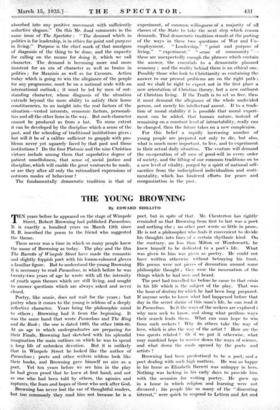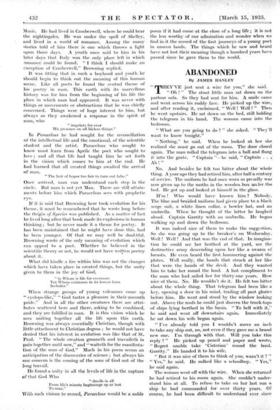THE YOUNG BROWNING
By EDWARD SHILLITO
TEN years before he appeared on the stage of Wimpole Street, Robert Browning had published Paracelsus. It is exactly a hundred years on March 15th since R. B. inscribed the poem to the friend who suggested the theme.
There never was a time in which so many people knew the name of Browning as today. The play and the film The Barrette of Wimpole Street have made the romantic and slightly foppish poet with his lemon-coloured gloves a familiar figure. But to understand the young Browning it is necessary to read Paracelsus, in which before he was twenty-two years of age he wrote with all_ the intensity of youth upon themes which are still living, and sought to answer questions which are always asked and never closed.
Poetry, like music, does not wait for the years ; but poetry when it comes to the young is seldom of a deeply reflective character. Years bring the philosophic mind to others ; Browning had it from the beginning. It was the same hand that wrote Paracelsus and The Ring and the Book ; the one is dated 1835, the other 1868-69. At an age in which- undergraduates are preparing for their Finals, -Browning had sketched with his splendid imagination the main outlines on which he was to spend a long life of unbroken devotion. But jt is unlikely that in Wimpole Street he looked like the author of Paracelsus ; poets and other writers seldom look like their books, and Browning gave himself no airs as a poet. Yet ten years before we see him in the play he had given proof that he knew at first hand, and not as one who had been told by others, the agonies and raptures, the.fears and hopes of those who seek after God.
Browning has never lost the ear of thoughtful readers, but too commonly they read him not because he is a poet, but in spite of that. Mr. Chesterton has rightly reminded us that Browning from first to last was a poet . and nothing else ; no other poet wrote so little in prose. He is- not a philosopher who finds it convenient to divide his thoughts into lines of a certain rhythmic kind. On the contrary, no - less than Milton or Wordsworth, he knew himself to be dedicated to a poet's life. What was given to him was given as poetry. He could not have written otherwise without betraying his trust. His poems were not pieces of decoration around some philosophic thought ; they were the incarnation of the things which he had seen and heard.
The poet had travelled far before he came to that crisis in his life which is the subject of the play. That was the hour of destiny for which he had been long prepared. If anyone seeks to know what had happened before that day in the secret shrine of this man's life, he can read it in Paracelsus. In it the ways of the seekers are explored ; why men seek to know, and along what perilous ways their search leads them. What can man hope to win from such seekers ? Why do others take the way of love, which is also the way of the artist ? How are the two quests related ? Or if we put it otherwise, what may mankind hope to receive down the ways of science, and what down the roads opened by the poets and artists ?
Browning had been predestined to be a poet, and a poet dealing with such high matters. He was as happy in his home as Elizabeth Barrett was unhappy in hers. Nothing was lacking in his early days to provide him with the occasion for writing poetry. He grew up in a home in which religion and learning were not divorced ; his people like so many of the "dissenting interest," were quick to respond to Letters and Art and Music. He had lived in Camberwell; where he could hear the nightingales. He was under the spell of Shelley, and lived in a world of romance. Among the many stories told of him there is one which throws a light upon those days. A youth once said to him in his later days that Italy was the only place left in which romance could be found. "I think I should make an exception of Camberwell," Browning replied.
It was fitting that in such a boyhood and youth he should begin to think out the meaning of this human scene. Like all poets he found the central theme of his poetry in man. This earth with its marvellous history was for him from the beginning of his life the place in which man had appeared. It was never with things or movements or abstractions that he was chiefly concerned. Things were of huge interest to him, but always as they awakened a response in the spirit of man, who
"imprints for ever His presence on all lifeless things."
In Paracelsus he had sought for the reconciliation of the intellectual life and the emotional, of the scientific student and the artist. Paracelsus who sought to know must learn from Aprile the poet who sought to love ; and all that life had taught him he set forth in the vision which conies to him at the end. He had learned that all created things awaited the arrival of man.
"The heir of hopes too fair to turn out false."
Once arrived, man can understand each step in the circle. Bu man is not yet"Man. There are still attain- ments before him which Paracelsus sees with prophetic. eye.
If it is said that Browning here took evolution for his theme, it must be remembered that he wrote long before the Origin of Species was published. As a matter of fact -he lived long after that book made its explosions in human thinking ; but he never made it a theme for poetry. It has been maintained that he might have done this, had he been younger. Of that we may well be doubtful. Browning wrote of the only meaning of evolution which can appeal to a poet. Whether he believed in the scientific theory or not, he would not have written poetry about it.
What did kindle a fire within him was not the changes which have taken place in created things, but the unity given to them in the joy of God,
"in Whom is life for evermore Yet Whom existence in its lowest form Includes."
When strange groups of young volcanoes come up " cyclops-like," "God tastes a pleasure in their uncouth pride." And in all the other creatures there are attri- butes scattered here and there, asking to be combined, and they are fulfilled in man. It is this vision which he sees uniting together all the life upon this earth. Browning was always essentially Christian, though with little attachment to Christian dogma ; he would not have denied that his interest in evolution was like that of St. Paul. "The whole creation groaneth and travaileth in pain together until now," and " waiteth for the manifesta- tion of the sons of God." Much in his poem seems an anticipation of the discoveries of science ; but always his one concern is the coming of the sons of God out of the long travail.
He found a unity in all the levels of life in the rapture of that God Who
"dwells in all From life's minute beginnings up at last To man."
With such visions to record, Paracelsus would be a noble poem if it had come at the close of a long life ; it is not the less worthy of our admiration and wonder when we find in it the record of the first journeys of a young poet in unseen lands. The things which he saw and' heard have not lost their meaning though a hundred years have passed since he gave them to the world.











































 Previous page
Previous page